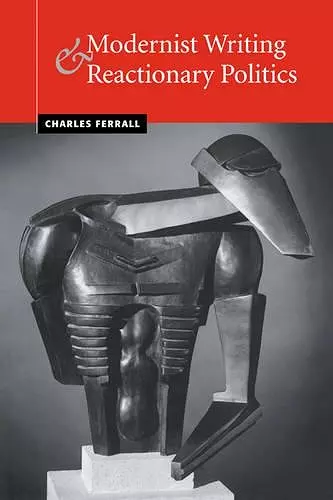Modernist Writing and Reactionary Politics
Format:Paperback
Publisher:Cambridge University Press
Published:1st Oct '09
Currently unavailable, and unfortunately no date known when it will be back
This paperback is available in another edition too:
- Hardback£60.00(9780521793452)

Ferrall offers insights into the relation between modernist aesthetics, technology and politics.
Ferrall argues that the politics of Yeats, Pound, Eliot, Lawrence, and Wyndham Lewis were a response to the separation of art from an increasingly industrialised society. Fascism became attractive to these writers because it promised to reintegrate art into society while simultaneously guaranteeing its autonomy.In Modernist Writing and Reactionary Politics, Charles Ferrall argues that the politics of Yeats, Pound, Eliot, Lawrence, and Wyndham Lewis were a response to the separation of art from an increasingly industrialised society. Fascism became attractive to these writers because it promised to reintegrate art into society while simultaneously guaranteeing its autonomy. Yet with the exception of Pound and Yeats, these writers all finally rejected fascism, preferring instead to see the aesthetic as a sphere in permanent opposition to liberal democracy, rather than the basis for a new social order. Individual chapters focus on Yeats and decolonisation, Pound and 'the Jews', Eliot and the uncanny, and Lawrence and homosexuality, and Lewis and the Cartesian primitive. Ferrall's account of why some of the greatest writers of the early twentieth century became involved in reactionary politics offers insights into the relation between modernist aesthetics, technology and avant-gardism.
"This is a carefully researched, thoughtful exposition of the views of five influential modernists." Modernism/Modernity 11/01
ISBN: 9780521120821
Dimensions: 229mm x 152mm x 12mm
Weight: 320g
212 pages